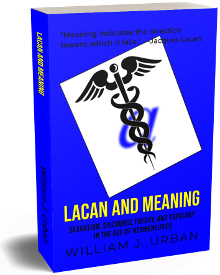LACAN AND MEANING
SEXUATION, DISCOURSE THEORY, AND TOPOLOGY IN THE AGE OF HERMENEUTICS
CHAPTER 3
LACAN ON MEANING
— page 64 —
encounter linguistics’ reign, it had to anticipate its formulations. Conversely, it is Freud’s discovery that gives the signifier/signified opposition its full scope: for the signifier plays an active role in determining the effects by which the signifiable appears to succumb to its mark, becoming, through that passion, the signified.’31
He subsequently writes how this has led to a ‘passion of the signifier’ which has opened up ‘a new dimension of the human condition in that it is not only man who speaks, but in man and through man that it [ça] speaks.’ This ‘it’ speaks in ‘the Other,’ what Lacan in his structuralist period equates with the symbolic order, or the battery of signifiers that make up the unconscious. This is so ‘because it is there that the subject finds his signifying place in a way that is logically prior to any awakening of the signified.’ Lacan will rearticulate the underlying logic of the relation between the subject and signifying structure into his final decades. In terms of the present écrit, it is expressed in two different ways. The first has to do with distinguishing the phallus qua signifier from the meaning of the phallus. Their distinction is often overlooked in the literature. Perhaps rather predictably, as the very title of the paper leads one to suspect it will focus on the meaning (signification) of the phallus. Yet a cursory glance through its pages confirms that Lacan most often speaks of the phallus in its capacity as a signifier and not as a signified. And again there is an order of logical dependence: ‘[T]he phallus is a signifier...that is destined to designate meaning effects as a whole, insofar as the signifier conditions them by its presence as signifier.’32 The two aspects of the phallus are therefore related. The meaning of the phallus concerns a subjective experience. It is an experience of virility, the pleasurable feeling of potentially grasping all the signifiers (and thus all the meanings) in a structure. But it is also an experience of impotence, the painful realization that such an all (and the total meaning it potentially conveys) forever eludes one’s grasp. The overall experience is thus one of jouissance, the pleasured pain of a pulsation between everything and nothing, as when a friend unacquainted with your area of expertise suddenly inquires after its meaning. Such an auspicious occasion is often met with a feeling of helplessness or in psychoanalytic terms, the experience of symbolic castration.33
What should not be overlooked is how this experience of the impossible fullness of meaning is itself marked by a signifier, and one that is entirely devoid of a signified. To explain this, consider how for any network of signifiers to operate as a differential system, it must contain a lack which cannot be filled so
31 Lacan, “The Signification of the Phallus,” 577–8.
32 Ibid., 579.
33 In other words, symbolic castration causes one to excitedly declare how he knows the true meaning of some situation (a success) – much like Michael Jackson’s enthusiastic “This is it!” – yet is simultaneously an experience proving him utterly incapable of explaining what precisely that meaning is (a failure).
full text of Lacan and Meaning
FREE Lacanian-themed puzzles

